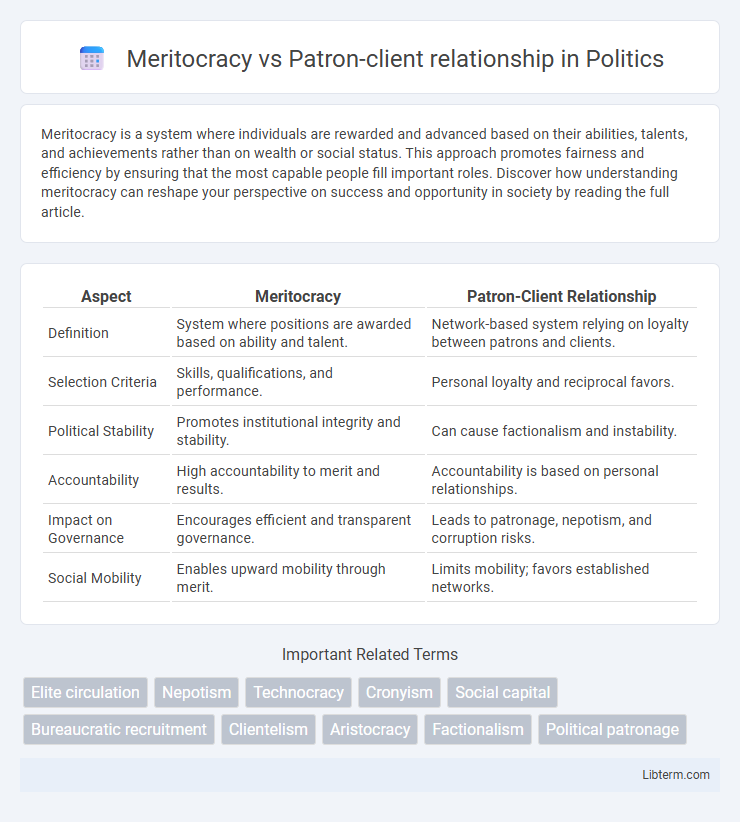Meritocracy is a system where individuals are rewarded and advanced based on their abilities, talents, and achievements rather than on wealth or social status. This approach promotes fairness and efficiency by ensuring that the most capable people fill important roles. Discover how understanding meritocracy can reshape your perspective on success and opportunity in society by reading the full article.
Table of Comparison
| Aspect | Meritocracy | Patron-Client Relationship |
|---|---|---|
| Definition | System where positions are awarded based on ability and talent. | Network-based system relying on loyalty between patrons and clients. |
| Selection Criteria | Skills, qualifications, and performance. | Personal loyalty and reciprocal favors. |
| Political Stability | Promotes institutional integrity and stability. | Can cause factionalism and instability. |
| Accountability | High accountability to merit and results. | Accountability is based on personal relationships. |
| Impact on Governance | Encourages efficient and transparent governance. | Leads to patronage, nepotism, and corruption risks. |
| Social Mobility | Enables upward mobility through merit. | Limits mobility; favors established networks. |
Understanding Meritocracy: Definition and Principles
Meritocracy is a system where individuals advance based on their abilities, talents, and achievements rather than on social status or personal connections. Core principles include equal opportunity, performance-based evaluation, and rewarding competence to ensure efficient and fair allocation of resources and positions. This contrasts sharply with patron-client relationships, which rely on loyalty and favoritism rather than merit for social mobility and influence.
What is the Patron-Client Relationship? Key Features
The patron-client relationship is a socio-political system where a powerful individual (patron) provides resources, protection, or opportunities to a less powerful person (client) in exchange for support, loyalty, or services. Key features include asymmetrical power dynamics, reciprocal obligations, personalized ties, and reliance on informal networks rather than formal institutions. This relationship often shapes access to political influence and economic benefits, contrasting with meritocratic principles that prioritize ability and achievement.
Historical Roots: Meritocracy vs Patron-Client Systems
Meritocracy traces its roots to ancient Confucian China, where civil service examinations selected officials based on knowledge and competence, contrasting sharply with patron-client systems rooted in feudal societies where loyalty and personal ties determined power distribution. Patron-client relationships dominated classical Rome and Renaissance Europe, reinforcing social hierarchies through reciprocal obligations rather than merit. This historical divergence reflects how meritocracy emphasizes skill-based advancement while patron-client systems prioritize network-based influence.
Impacts on Organizational Performance
Meritocracy enhances organizational performance by promoting efficiency, innovation, and talent retention through fair evaluation and reward systems. In contrast, patron-client relationships often hinder productivity and morale by fostering nepotism, favoritism, and resource misallocation. Such dynamics lead to decreased trust and collaboration, negatively impacting overall organizational effectiveness.
Influence on Social Mobility and Equity
Meritocracy promotes social mobility by rewarding individuals based on talent, effort, and achievements, fostering a more equitable society where opportunities are accessible regardless of background. In contrast, patron-client relationships often inhibit social mobility by privileging loyalty and personal connections over merit, reinforcing existing social hierarchies and perpetuating inequality. This dynamic limits equitable access to resources and opportunities, consolidating power within established networks instead of promoting broader societal fairness.
Corruption and Accountability: A Comparative Analysis
Meritocracy promotes transparency and accountability by rewarding individuals based on competence and performance, reducing opportunities for corruption through institutionalized evaluation processes. Patron-client relationships often foster corruption by prioritizing loyalty and favoritism over merit, which undermines accountability and perpetuates informal power networks. Comparative analyses reveal that meritocratic systems enhance governance effectiveness by establishing clear standards, whereas patronage systems weaken public trust through opaque decision-making and resource allocation.
Cultural Factors Shaping Each System
Meritocracy is shaped by cultural values emphasizing individual achievement, education, and talent as primary sources of social mobility and success. In contrast, patron-client relationships are deeply rooted in collectivist cultures that prioritize loyalty, familial ties, and reciprocal obligations over formal qualifications. These cultural factors influence how power and resources are distributed, with meritocracy fostering competition based on merit and patron-client systems relying on personal networks and trust.
Case Studies: Global Examples of Both Models
In Singapore, meritocracy drives public sector success through rigorous exams and performance-based promotions, resulting in a highly efficient government. Contrastingly, in parts of Latin America, patron-client relationships dominate political and economic systems, where loyalty and personal connections often outweigh merit in resource allocation. India demonstrates a hybrid scenario where merit-based procedures coexist with patronage networks, impacting bureaucratic effectiveness and social mobility.
Challenges and Criticisms Faced by Each Structure
Meritocracy faces challenges such as systemic biases that undermine equal opportunity, often favoring individuals from privileged backgrounds despite purported fairness in evaluating talent and achievement. Patron-client relationships are criticized for fostering corruption, nepotism, and inefficiency by prioritizing loyalty and personal connections over competence and merit. Both structures struggle to balance fairness and effectiveness, with meritocracy risking elitism and exclusion, while patronage systems can perpetuate inequality and hinder social mobility.
Future Trends: Evolving Dynamics in Modern Societies
Future trends in meritocracy emphasize increased reliance on data-driven evaluations and AI-assisted decision-making to promote fairness and transparency in talent recognition. Patron-client relationships are evolving, integrating digital platforms that both reinforce personalized networks and challenge traditional power hierarchies through broader social connectivity. Modern societies are witnessing a shift where meritocratic principles drive institutional policies, while patronage adapts to hybrid forms combining reputation systems and community-based trust mechanisms.
Meritocracy Infographic

 libterm.com
libterm.com